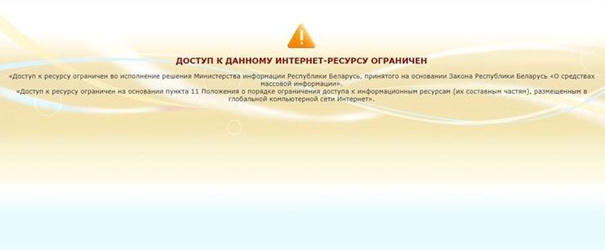
Human rights initiative «Journalists for Tolerance» website blocked in Belarus — J4T.by/J4T.info
«Journalists for Tolerance» is the oldest community that works to counter hate speech in the Belarusian media. Problems with access to the J4T resource in September 2022 were reported by users from Belarus.
What is happening and what to do about it — answers provided by media and digital security experts.

Background
J4T — Journalists for Tolerance is the first organization in Belarus that started systematic work to counter hate speech and increase the positive visibility of vulnerable groups in the media. Thanks to the hate speech monitoring and the reaction of the media community to it, the value of equality and non-discrimination on the basis of national, gender, age, racial and other identities has grown stronger in Belarus.
The blocking of websites of human rights initiatives and media outlets has become common practice of Belarus’ state bodies. Such a statement of the situation in the Belarusian internet is given by Aleh Aheyeu, a lawyer of the Belarusian Association of Journalists. By blocking websites independent from the state propaganda, the dictatorship’s bodies deprive society of access to truthful information.
«This completely falls under the definition of censorship,» says Aleh Aheyeu. — Our experience shows that the government has not left any opportunities to fight this or appeal against the decisions of state bodies»
Fact
Almost all Belarusian socio-political websites of are now blocked. BAJ monitors repressions against media outlets. According to statistics, the websites of 44 Belarusian media outlets were blocked as of the beginning of autumn 2022.
Fortunately, in the 21st century, people have invented a means against censorship with 100% effectiveness — these are VPN applications for smartphones and software that allow to bypass blocking. Below is how to use it.
Problem #1. Massive blocks
Media lawyer Aleh Aheyeu tells:
«In Belarus, blocking websites is an out-of-court procedure. This is decided, roughly speaking, by officials in their offices.
After the 2020 elections, the list of bodies that can block has expanded. Prosecutor’s offices, the KGB and others were added to the Ministry of Information.
And today there are massive blocks.«
«The work of major media, like tut.by, was stopped due to the recognition of some of their materials as extremist. And currently almost all the content created by Belarusian media is recognized as extremist, since in today’s Belarus it is very easy to block any resource. Most of the blocks are due to links to publications made from 5 or 7 to 10 years ago.»
Problem #2. Inability to appeal the decision to block
Lawyer Aleh Aheyeu recalls:
«The first blocking and appeal in the history of Belarus concerned the content of the website of the socio-political Movement for the Legalization of Marijuana in Belarus. It was an ordinary website that distributed socio-political content. The Ministry of Information blocked it for distributing pictures from an unauthorized mass event.
We have appealed this decision in court. In this situation, in my opinion, there were no even procedural grounds for blocking.»
Today, the situation has changed a lot — Belarusians have been deprived of the opportunity to use judiciary appeal procedure.
«It is almost impossible to get out of the lockdown,» says lawyer Aleh Aheyeu. — The Ministry of Information responds to requests only three times.
How does it work? Let’s assume there is a website where a link to tut.by was placed 7 years ago. The owner is informed about this fact. The owner writes to the Ministry of Information, saying that this link was deleted, it no longer exists. But the Ministry of Information replies that they have found another link. The owner informs then that the second link has also been deleted. The same thing again…
That’s how you can contact the Ministry of Information three times. My experience says that after the third appeal, they put an email in the ban list and the emails simply do not reach. We receive a message that the email cannot be delivered.»
Problem #3. Google’s artificial intelligence is on the side of propaganda
The first two problems lead to the third.
The first two problems lead to the third.
«Today we are faced with the fact that, among the Belarusian resources, Google puts propaganda sites in the first positions of the search. Algorithms lead to the fact that search slips propaganda materials to users, and Google pessimizes the sites of independent media and puts them at the end of the search. Why?
If users without a VPN click in a search engine on the link of a blocked resource and see that the content cannot be opened, they immediately leave. And that’s why the search engine pessimizes such resources,» lawyer Aleh Aheyeu sums another problem up.
Problem #4. Lack of advertising budgets
Some media outlets that still work from Belarus have felt it for themselves. If the site is blocked, then the problem with advertising begins. Advertisers refuse to be placed on such sites.
The spring effect
Lawyer Aleh Aheyeu notes that blocking accelerated the evolution of media:
«Many media outlets are switching to the so-called multiplatform. When the content is equally distributed via telegram, YouTube and other platforms. Here the authorities have much less opportunities to block»
«From practice, we see that the authorities, as ordinary people, can turn to Facebook and Youtube with a request to block. But their requests are not met because Facebook and YouTube do not consider the decisions of state bodies to meet the standards of freedom of expression. However, the Vkontakte blocks some groups, we know that,» the lawyer adds.
5 answers about VPN
We asked the most important questions about VPN — a means of circumventing censorship with 100% efficiency — to a digital security expert who wished to remain anonymous.
Is it legal to use a VPN on the territory of Belarus?
«On the territory of Belarus, the use of VPN is quite legal. Today, no one can ban it or hold you accountable. There is not a single article in either the Criminal or the Administrative Code. There are no initiatives to legally prohibit the use of VPN today.
Moreover, large banks and stores themselves use VPNs for security purposes,» the expert says.
«If you are being personally monitored, then questions may arise. For example, a provider transmits information to a ‘comrade major’ that someone is constantly using a VPN. And in theory, this may be the reason for the question: Why are you hiding something there, dear? But this is still in theory. There is no such thing in practice,» the digital security expert comments.
What is a VPN?
«VPN is a virtual private network, a technology for securely connecting to servers around the world, plus a service for encrypting data that is securely transmitted through this channel,» says the expert.
«Roughly speaking, a VPN is such a thing that allows you to hide from ‘comrade majors’ and providers information about which sites you go to, what you do there: watching porn or listening to music,» the expert adds.
The provider only sees that you were connected to the server, let’s say, in New Zealand, how much time you spent there and how much traffic was transmitted. And what is inside this traffic is unknown.
Therefore, a VPN helps to gain access to blocked sites,» the specialist summarizes.
How to use a VPN?
«Google surche ‘VPN’ on your computer, select a program, install it on your computer or browser. Run the program, click connect — and go where you want.
For mobile phone, one needs to install a high-quality application from the Play Store or Apple Store. Please download absolutely legal programs, install them, launch them to surf the Internet,» the digital security expert advises.
The main thing is what kind of VPN to use?
«A reliable VPN is the one that digital security experts advise. Proton VPN can be considered reliable. Look for something big with open source. Here, I would advise you to read the site Security.
Using an advertising link to install a VPN is the most dangerous,» says the expert.
Special services set up their VPNs to monitor citizens?
«This is absolutely logical. There is a case when American intelligence agencies have created the most reliable messenger in the world as an alternative to the Signal. This messenger was distributed among drug lords and thus the special services collected information. I am sure that the special services of other countries do the same. This is a very simple way to track what a particular person is doing, because when you are using a VPN, you lose your vigilance,» the expert notes.





